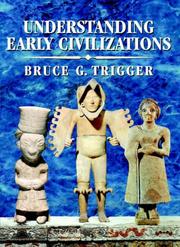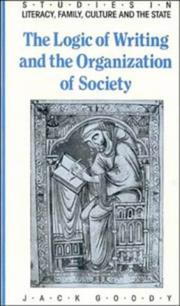| Listing 1 - 2 of 2 |
Sort by
|

ISBN: 9780521705455 9780521822459 0521822459 9780511840630 0521705452 1316023826 1316022625 0511840632 Year: 2003 Publisher: Cambridge Cambridge University Press
Abstract | Keywords | Export | Availability | Bookmark
 Loading...
Loading...Choose an application
- Reference Manager
- EndNote
- RefWorks (Direct export to RefWorks)
This book offers the first detailed comparative study of the seven best-documented early civilizations: ancient Egypt and Mesopotamia, Shang China, the Aztecs and adjacent peoples in the Valley of Mexico, the Classic Maya, the Inka, and the Yoruba. Unlike previous studies, equal attention is paid to similarities and differences in their sociopolitical organization, economic systems, religion, and culture. Many of this study's findings are surprising and provocative. Agricultural systems, technologies, and economic behaviour turn out to have been far more diverse than was expected. These findings and many others challenge not only current understandings of early civilizations but also the theoretical foundations of modern archaeology and anthropology. The key to understanding early civilizations lies not in their historical connections but in what they can tell us about similarities and differences in human behaviour.
Civilization, Ancient. --- Social archaeology. --- Prehistoric peoples. --- Civilisation ancienne --- Archéologie sociale --- Homme préhistorique --- archaeology --- prehistoric --- civilization --- History of civilization --- Archeology --- Assyria, Babylonia, Mesopotamia --- Egypt --- China --- Mexico --- Civilization, Ancient --- Prehistoric peoples --- Social archaeology --- Archaeology --- Cavemen (Prehistoric peoples) --- Early man --- Man, Prehistoric --- Prehistoric archaeology --- Prehistoric human beings --- Prehistoric humans --- Prehistory --- Human beings --- Antiquities, Prehistoric --- Ancient civilization --- Methodology --- Primitive societies

ISBN: 0521339626 0521327458 1139085395 0511621590 9780511621598 9780521327459 9780521339629 Year: 1986 Publisher: Cambridge Cambridge University press
Abstract | Keywords | Export | Availability | Bookmark
 Loading...
Loading...Choose an application
- Reference Manager
- EndNote
- RefWorks (Direct export to RefWorks)
This book assesses the impact of writing on human societies, both in the Ancient Near East and in twentieth-century Africa, and highlights some general features of social systems that have been influenced by this major change in the mode of communication. Such features are central to any attempt at the theoretical definition of human society and such constituent phenomena as religious and legal systems, and in this study Professor Goody explores the role of a specific mechanism, the introduction of writing and the development of a written tradition, in the explanation of some important social differences and similarities. Goody argues that a shift of emphasis from productive to certain communicative processes is essential to account adequately for major changes in human societies. Whilst there have been previous descussions of the effect of literacy upon social organisation, no study has hitherto presented the general synthesis developed here.
#SBIB:309H518 --- #SBIB:39A2 --- #SBIB:303H0 --- 316.774:003 --- 316.774:003 Sociologie van het schrift --- Sociologie van het schrift --- Verbale communicatie: sociologie, antropologie, sociolinguistiek --- Antropologie: methoden en technieken --- Methoden in de sociale wetenschappen: algemeen --- Ancient civilization --- Antieke beschaving --- Antieke cultuur --- Beschaving [Antieke ] --- Beschaving van de oudheid --- Civilisation de l'antiquité --- Civilization [Ancient ] --- Cultuur [Antieke ] --- Civilization, Ancient --- Social evolution --- Writing --- Hieroglyphics --- Cultural evolution --- Cultural transformation --- Culture, Evolution of --- Culture --- Evolution --- Social change --- Chirography --- Handwriting --- Language and languages --- Ciphers --- Penmanship --- History --- Social aspects --- Africa, West --- Civilization. --- History of civilization --- Ecriture --- Evolution sociale --- Civilisation ancienne --- Histoire --- Aspect social --- Afrique occidentale --- Civilization --- Civilisation --- Africa [West ] --- Writing - History. --- Writing - Social aspects. --- Social evolution. --- Civilization, Ancient. --- Africa, West - Civilization. --- Social Sciences --- Anthropology --- History. --- Social aspects.
| Listing 1 - 2 of 2 |
Sort by
|

 Search
Search Feedback
Feedback About UniCat
About UniCat  Help
Help News
News